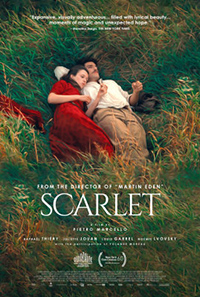Come Sail Away: Marcello Runs Aground in Muddled Adaptation
 Pietro Marcello returns to literature for inspiration in his third narrative feature (and French language debut), Scarlet (L’Envol), based on the 1923 novel Scarlet Sails by beloved Russian novelist Alexander Grin (or Green, depending on the translation). Much like he did with Jack London’s Martin Eden (2019), utilizing the text loosely for his own unique vision, this is far removed from more traditional takes on Grin’s novel, like the 1961 Russian language version which hewed close to the original romantic fairy tale. Unfortunately, the liberties transposed upon the simplicity of Grin’s text results in an oddly disjointed take.
Pietro Marcello returns to literature for inspiration in his third narrative feature (and French language debut), Scarlet (L’Envol), based on the 1923 novel Scarlet Sails by beloved Russian novelist Alexander Grin (or Green, depending on the translation). Much like he did with Jack London’s Martin Eden (2019), utilizing the text loosely for his own unique vision, this is far removed from more traditional takes on Grin’s novel, like the 1961 Russian language version which hewed close to the original romantic fairy tale. Unfortunately, the liberties transposed upon the simplicity of Grin’s text results in an oddly disjointed take.
What’s meant to be the emancipation of a young woman in rural France across a span of two decades instead contradicts these intentions and ends up dabbling with too many tropes. Unfortunately, Marcello’s storyline already feels hamstrung when the narrative finally switches to its lead character as the focal point.
Raphael (Raphael Thiery) returns home after surviving the battlefields of WWI to discover his wife Marie died in childbirth. His infant daughter Juliette has been tended to by Adeline (Noemie Lvovsky), a lonely farmer outside the village who took Marie in while he was away. She offers to let Raphael stay, even though she cannot pay him. While Adeline struggles to pay back her husband’s debts, who never returned from the war, she assists Raphael in finding a job as a woodworker in town, for which he has a special talent. But eventually, the truth of Juliette’s birth is revealed. Adeline confesses Marie was raped by the local bar owner, Fernand (Francois Negret). The resulting fallout of this revelation marks Raphael, Adeline and Juliette as pariahs. When Juliette becomes a young girl, a woman (Yolande Moreau) lurking in the woods prophesies a young man will arrive on a boat with scarlet sails one day and take her away to another land. The tall tale is used to further demean Juliette by her peers, taunted as a witch due to her headstrong ways. Eventually, Jean (Louis Garrel), a pilot whose plane is grounded near Juliette’s home, finds himself enamored with the beautiful young woman.
“You can do so-called miracles with your own hands,” is the Grin quote opening the film, conveying, more or less, the scope of the original’s narrative, where one’s dreams can come true by willing them into existence. The original is a pseudo-adventure narrative hinged on the successful romantic union of Juliette and Jean, which reads like Robert Louis Stevenson. Marcello adds a variety of tonal layers, such as coming-of-age, the suppression of women, progress of invention, and folklore style witchcraft. Added to this is a much more strenuous back story for Juliette’s birth, a child of rape whose own step brother desires her. This angle (which includes Lolita Chammah, Isabelle Huppert’s daughter, in a wasted role as the Negret’s silent, grim wife) keeps popping up until reaching ridiculous fruition during a climax which sails the film into silliness.
What’s more odd is how Marcello and his usual scribe Mauricio Braucci pad out the supporting characters to such an extent they eclipse the willowy Juliette, and the most compelling screen moments arrive in the form of a sympathetic Raphael Thiery (Staying Vertical, 2016) and the usually astute Noemie Lvovsky. Additionally, Juliette’s symbolic salvation of the scarlet sails in the novel evolves into streamers from an airplane, which ties into the bird motif sprinkled throughout. Juliette imagines an animated sparrow flying in the sky to take her to her mother, and finds herself often reading Louise Michel’s poem L’Hirondelle (Yolonde Moreau adds an extra layer of confluence with her turn in the bizarre 2008 film Louise-Michel). Juliette Jouan (who shares a striking resemblance to Tom Holland) doesn’t appear until forty plus minutes into the film, and her adult trajectory and eventual romance with Louis Garrel’s pilot feels rushed and humdrum.
At moments, Scarlet promises to hurtle full-tilt into giallo territory with Yolanda Moreau’s woman in the woods and Lvovsky’s pseudo-sorcery. Like a siren, Juliette croons while bathing in a river, initially attracting the attention of Jean. But like several sequences in the film, the scene doesn’t embrace the ridiculousness of this moment, and Marcello’s sincerity is where the adaptation runs afoul.
By the time we get to dusting off Juliette’s deferred dream, a tacked on bit of incantation regarding Garrel feels cheesy rather than magical. Although beautifully shot by Marco Graziaplena (Mektoub, My Love: Canto Uno and Intermezzo), with plenty of arresting frames and textured visuals, paired with a score suggesting whimsical intentions from Gabriel Yared, Scarlet is pretty, but an empty, eventually ungainly bauble.
Reviewed on May 18th at the 2022 Cannes Film Festival – Directors’ Fortnight. 103 Mins
★★½/☆☆☆☆☆


